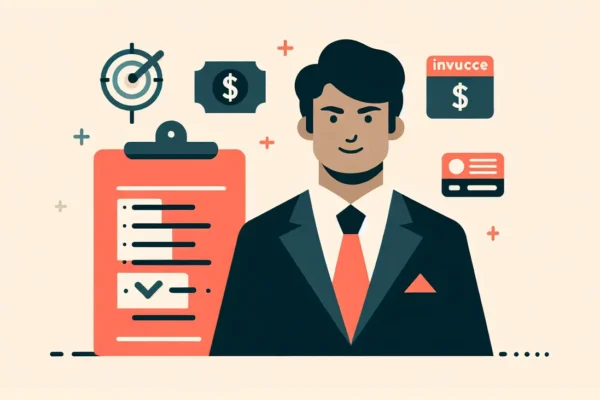Handling business finances efficiently is crucial for success. However, there are times when debts become overwhelming and external help is required. In this blog, we’ll explore signs that indicate when it’s time to consider seeking commercial debt collection assistance.
1. Consistent Late Payments
One of the first signs you may need help is when your clients consistently fail to pay on time, causing disruptions in your cash flow. This isn’t just a minor inconvenience; it can severely impact your ability to meet your own financial commitments. Regular late payments might suggest that the client is experiencing financial difficulties, or they might be prioritizing other debts over yours. When businesses face this challenge, it becomes necessary to ask: At what point does it become less about patience and more about taking action? If you’re noticing a trend where promises of payment fall through time and again, it’s crucial to re-assess the situation. In such cases, involving a professional debt recovery specialist can prove beneficial. They bring expertise in dealing with non-compliant clients and can help ensure timely payment while maintaining a positive business relationship.
2. Unreachable Clients
If clients become hard to reach or avoid communication altogether, it’s a signal that their intention to pay is questionable, requiring further action. Such behavior could be a red flag indicating they are deliberately avoiding payment because their financial position isn’t stable. In these situations, businesses may struggle to get timely updates or responses, adding to operational uncertainties. It’s vital to have strategies in place to address this issue, including using technology to track communications. Implementing a systematic process can help manage these situations better and ensure that no communication channels remain unexplored in solving payment issues. Moreover, when clients become ghostlike in communication, it might be time to consider engaging a debt collection specialist who possess the necessary skills to handle such circumstances.
3. Constant Promises Without Payments
When a customer continuously makes promises to pay but doesn’t follow through, it might be time to consult a debt collection professional. These broken promises can be an indication of unwillingness to pay or financial mismanagement on their part. As a business owner, constantly following up on payments drains valuable time and resources, and there’s a risk of missing other important tasks. Building a system for effective credit management can be a helpful preventative measure. In cases where debt becomes notably persisting, turning to a specialist adept in strategizing debt collection ensures steps toward a practical resolution while safeguarding your business interests.
4. Mounting Past-Due Invoices
An increasing number of past-due invoices can hinder business operations and should be addressed promptly with expert assistance. This backlog affects not only cash flow but also reflects the reliability of your credit management processes. Proactive monitoring of accounts receivables to identify outstanding debts early can curtail the issue before it escalates. Automating reminder systems can improve follow-up efforts, preventing debts from becoming overdue. If your number of overdue accounts continues to rise despite these efforts, the intervention of a commercial debt collector becomes vital. Their ability to implement structured recovery methods can result in successful payment recovery, ensuring ongoing cash flow and keeping your business financially healthy.
This can especially become a point of concern if the cycle of delayed payments persists over months, leading to compounding financial difficulties. It’s no longer just about a missing fund here or there. Instead, this becomes a matter of preserving your operational stability. With trained professionals, addressing the bulk of unpaid invoices can help alleviate pressure. Bringing clarity and resolution directly contributes to better financial management in your business, allowing you to redirect focus toward achieving business goals.
5. Customers Go Out of Business
If you’re notified that a client has gone out of business, recovering debt becomes more complex and may need specialized collection efforts. The closure of a client’s business usually means liquidating assets to cover liabilities, making the process of debt recovery challenging. It’s imperative to engage early with legal advisors or debt collection professionals who can help plot feasible strategies, such as establishing a claim on remaining assets or negotiating with administrators. In these circumstances, standing in the queue without expert guidance may lead to lost opportunities to recoup your dues. Understanding and navigating insolvency laws becomes crucial, as paying particular attention to inventorial resilience can affect the outcome. With professional intervention, you may navigate the intricacies of liquidation effectively and increase your chances of debt recovery.
The symbolic end of a business does not necessarily mean your pursuit ends there; instead, it emphasizes the strategic foresight in managing such unfortunate scenarios. Highlighting the importance of partnership with experienced debt recovery services can save significant resources and, most importantly, protect your business’s economic stability.
6. Difficulty in Negotiating Payment Plans
Struggling to set up a payment plan or being unable to get an agreeable commitment from a debtor is a red flag needing professional intervention. This difficulty could suggest that the debtor is unwilling or unable to meet even the most lenient terms, hinting at deeper financial issues. Such situations demand a different approach, potentially necessitating professional mediation. By using negotiation tactics, debt recovery specialists can often secure partial payments, setting foundations for ongoing repayment. Specialists possess the skills to facilitate arrangements that might not be achievable otherwise and are adept at working within the intricate framework of financial viability and legal compliance. Allowing professionals to handle these conversations can lead to clearer agreements, comfort for your clients, and secured payments for your business. Ultimately, employing tailored strategies can beneficially alter payment dynamics, making it less probable you’ll experience recurring issues.
7. Legal Complications or Disputes
If debt recovery risks legal complications, it’s advisable to seek experts who can handle such disputes efficiently. Legal entanglements can be detrimental, distracting from your primary business efforts. A scene where disagreements over debt or payment arise can quickly become problematic, particularly if contracts lack clarity. Navigating this gray area demands astute insight and dedication, qualities abundant among seasoned debt recovery teams. They provide guidance not only in legal jargon but also negotiate on behalf of businesses. By ensuring any legal steps remain ethical and principled, they help recover your dues without wrecking client relationships. Additionally, when formalized collections are warranted, debt recovery agencies can foster favorable judgments by representing your case professionally in legal forums.
Engaging professionals is often recommended early in complicated debt situations, where anecdotal knowledge remains invaluable. Understanding the best practices in recovery enhances your approach toward achieving better outcomes. Ultimately, this strategy safeguards your brand reputation and secures financial returns while navigating potential legal obstacles.
8. Strained Internal Resources
When your in-house team spends excessive time on debt recovery, affecting their core responsibilities, it’s a sign to consider outsourcing to professionals. Internal resources stretched too thin not only weakens operational efficiency but also places undue burden on employees. Often, the skills required to recoup long-standing debts surpass normal business acumen, revealing potential shortfalls in internal processes. By channeling such tasks to commercial debt collectors, your team gains time and focus to excel in primary business functions, contributing to growth and innovation. In doing so, not only is business organizational health improved, but it encourages employee wellness by diminishing stress associated with exhaustive collections.
Contrastingly, professionals unburdened by typical organizational constraints can expedite results. With access to sophisticated data-tracking methods, alongside robust networking, experts adeptly handle tricky situations. These specialists live and breathe this aspect of financial management, embedding efficiency into otherwise problematic dilemmas. Moreover, establishing trust by providing visible results sustains healthier financial environments. Allowing experts to bear the load can mean remarkable breakthroughs in cash flow, empowering your business toward long-term success free from drawn-out receivable issues.







